Elvis and religion

- A New "Elvis" Religion In the Future?
By Allan Saxe
(WBAP, August 19, 2002)
The world has just ended a nine- day celebration, observance or whatever one wishes to call it of the anniversary of the death of Elvis Presley. At first I thought such observances to be laughable, half-baked at best or just a bunch of people with little else to do having some fun. But listening to all the statements at Graceland by the worshipful multitude, the songs, the impersonations there is something more serious going on here. I will make every body that reads this column a small wager. But I am shielding myself by time. My proposition is that several hundred years from now Elvis Presley will be the central figure in a religion called "Elvisights." I personally, myself, with my own eyes and ears, saw and heard Elvis in the herb section at Whole Food Market several Saturdays ago. Every thing is in place for Elvis to become a god or at least a semi-god within a time period of about two hundred or so years. Moreover, that his songs and followers will become central to this new religion.
- Elvis is bigger than Jesus,' clerk says
By STEPHANIE NOLEN
(The Globe and Mail, August 17, 2002)
His words give them solace and comfort in times of trouble. He speaks directly to them. Though he is long dead, it is as if he never left, for they feel him close by all the time. Jesus? Uh, no. That would be Elvis Presley, that comforting, guiding presence. For many of the thousands of fans who have come here from all corners of the globe, and particularly from Middle America, Elvis is religion. And yesterday, the 25th anniversary of his death was celebrated much like other religious occasions in the Bible Belt: with candlelit vigils, public worship and, of course, souvenir T-shirts. "He makes me feel better. You can feel the spirit in his music," said JoAnne Reed, 60, a college secretary from Springville, Utah, who has come to Elvis Week for each of the past 10 years. "It touches my spirit. I used to think that was just a personal thing, and then I came here, and you realize it's so many people who feel the same way." ... For all that, though, there is a slight but tangible air of finality to this celebration. They won't live forever, these former bobby-soxers for whom Elvis is the most visceral symbol of lost youth. What happens when there is no one left who remembers sexy Elvis, radical Elvis; when he is recalled only as an overweight, rhinestone-spangled punchline?
- Elvis bust "weeps" in Dutch town
(Times of India, August 17, 2002)
A plaster bust of Elvis Presley wept "miracle" tears on Friday on the 25th anniversary of his death, its Dutch owner said. The 50-year-old professional Elvis impersonator in the small town of Deurne in the southern Netherlands also said the ghost of the King of Rock n' Roll appeared in his house last week. Wearing a tasselled black leather jacket, a wig and sunglasses, Toon Nieuwenhuisen said the bust, which he keeps in a spare room he has converted into a shrine to Elvis, started weeping just shortly after breakfast on Friday.
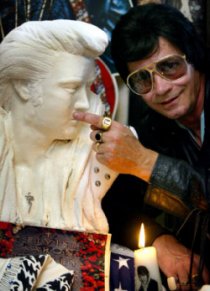
- The rockin' gospel according to Elvis
Australian, August 16, 2002, p. 12)
Twenty-five years after his death, the king remains so big that Elvis Week runs for nine days. To the chagrin of some, this second-born son has assumed almost divine status. As a musician, Elvis was only human. He had a good voice and great diction but his songs were not his own. ... What set Elvis apart was a style and mix of material that reflected not just rebellion but his Christian background. ... the crux of Elvis's legacy. Not only has he provided joy for billions of people, but without him, rock 'n' roll might well have died the death of 1000 fads, consigning black culture to the margins of white America. Elvis helped the US evolve into a more inclusive society.
- Gospel music and Elvis: Inspiration and consolation
(CNN, August 14, 2002)
He went from a humble birth in a shotgun shack in Tupelo, Mississippi, to rhinestone-studded super stardom, but during his roller coaster-like ascension and eventual fall, Elvis Presley never stopped humming gospel songs. "He loved to sing spirituals because they told a story," said Ray Walker, a singer with The Jordanaires, the legendary spiritual quartet that sang with Elvis for many years. "It was his roots. He was a deeply spiritual man, more spiritual than anyone around him".
- This Elvis has a mission in church
By ED GRISAMORE
(Macon Telegraph, August 14, 2002)
Tommy Youmans had his wisdom teeth taken out the day Elvis died. He remembers being numb from both the news and the anesthesia on Aug. 16, 1977. Later, he saved the front-page newspaper photograph of Elvis in the coffin. Although Youmans was only 16 years old, he had cut his musical teeth on the King. He had worn deep grooves in his sister's old 45 rpm Elvis records. He still remembers "Don't Be Cruel" was on the flip side of "Hound Dog." Of course, he never could have imagined so many threads of Elvis would still be running through his life 25 years later. Youmans is the minister of music at Lawrence Drive Baptist Church in Macon. But his calling extends far beyond his home pews. He calls it his "E-ministry," as in Elvis. It's his own version of Amazing Graceland. This King has no problem taking his message to the Methodists and the Presbyterians, either. His mission is to "promote Christian fellowship and glorify God."
- On the Web, e-shrines to Elvis: All things Presley find a home on the Net
By Lisa Napoli
(MSNBC, August 13, 2002)
At this stage of the Internet game, we know that anyone can build a Web shrine for any old celebrity. But a different order of magnitude applies to anything involving Elvis of course: The King warrants an entire search engine. Wouter Broekman was born the year Elvis died, but this young, enterprising Dutchman slash Elvis fan realized three years ago that in cyberspace, sites in Presley's honor were found willy-nilly. He took it upon himself to organize them, and ElvisFind.com was born. ... For some curious reason that proves American popular culture knows no geographic bounds, another major Elvis site is also maintained by the Dutch. The zine Elvis News offers a compendium of just that (only with Elvis, dead for so long, could there be so much current to report) as well as archival information, such as reviews, and the chance to be part of an Elvis community by signing up for a weekly e-mail update.
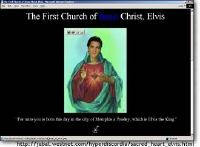
- Elvis the divine
By Rose DeWolf
(Philadelphia Daily News, August 8, 2002)
WHEN NORMAN Girardot first began talking about Elvis Presley as a religious figure, he was accused of sacrilege, of blasphemy, of ... well, being a kook. Girardot, a professor of religion at Lehigh University, remembers it well. "There was a newspaper report about an 'Elvis cult' at Lehigh. Alumni wanted to know what was going on. Thank God I had tenure." In fact, Girardot had - and has - more than tenure at Lehigh going for him. He has the title University Distinguished Professor. He is the author of a forthcoming major work on Chinese religions. Last year he edited the book "Daoism and Ecology" for the Harvard University Center for the Study of World Religions. But, no doubt about it, he gets more publicity for the course he has been teaching for the past half-dozen years titled "Jesus, Buddha, Mao and Elvis." It's a course about communities of people who share deeply held beliefs. It's about the charismatic figures who inspire those beliefs.
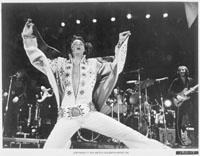
- August 2002: 25 Years Later... The Little Known Side of Elvis Presley -- A Spiritual Being who Lived a Human Life [book sale]
(PRWeb, June 8, 2002)
Discover something NEW about Elvis Presley that the general population still does not know. What does Elvis Presley have to do with Spirituality? The answer is PLENTY!
It is now 25 years after Elvis Presley's death on August 16, 1977. It is NOW time to recognize that Elvis was much more than just a rock 'n' Roll idol who died an early and tragic death. People are asking what does Elvis have to do with Spirituality? The answer is: PLENTY!
Elvis Presley(R) was a student of spiritual philosophies and an avid reader of many spiritual books. Of these, it is documented by his biographers, that his favorite book (next to his Bible) was The Impersonal Life. Elvis bought this book by the case and gave it away to his closest friends and acquaintances. He wanted EVERYONE to read The Impersonal Life and said to them: "You HAVE to read this!"
This is the little known spiritual side of Elvis Presley. This is the book Elvis "had been looking for all his life." The Impersonal Life is the book, according to his biographers, that spoke directly to Elvis' soul and changed his life forever. It was ground zero for his self-exploration and spiritual awareness. Here, Elvis found food for his soul and he devoured it.
Elvis loved The Impersonal Life for its purely liberating, awakening message. Today thousands more are discovering the message of The Impersonal Life with Elvis' lead. Now it's your turn to change your life with The Impersonal Life: Graceland(R) Edition. Discover what Elvis & thousands of other spiritual seekers through time have learned. Buy it, read it, give it away and find the light within.
- Elvis Has Left the Building
By Rusty Wright
(probe.org, June, 2002)
Elvis Lives!
Elvis lives. At least he does in the hearts of his fans. And they are everywhere. Twenty-five years after his death, our culture is still fascinated with the raven-haired, swivel-hipped entertainer. His songs fill the airwaves. His face graces postage stamps and velvet paintings in the U.S. and abroad. Thousands of the faithful annually trek to Graceland, his Memphis home, to pay homage to the king of rock and roll.
August 16, 2002, marks the twenty-fifth anniversary of Elvis Presley's death. Memphis will be rocking during "Elvis Week." Pilgrims can enjoy concerts and eat their favorite Elvis food (probably heavy on the grease and sugar). Meanwhile, impersonators abound. For instance, the "Flying Elvi" jump from 13,000 feet. (You read correctly. That's the "Flying Elvi." Scholars and real Elvis fans know that "Elvi" is the plural of "Elvis." We've got culture here at Probe.) Featured in a hit movie, these Las Vegas daredevils combine skydiving with Elvis nostalgia. They are even available for Las Vegas weddings: "Why settle for just one Elvis look-alike," asks the ad, "when you can have the entire ten-Elvi team in attendance on your special day?"
Internet sites tout Elvis fan clubs and even Elvis baby food. Wine connoisseurs have sighted "Always Elvis Wine." Former NFL coach Jerry Glanville often left two tickets for Elvis at the will-call window on game days.
Even academics are into Elvis. The University of Mississippi has held International Conferences on Elvis Presley. Scholarly seminars included, "Civil Rights: Martin Luther King, Jr., and Elvis;" "Elvis: The Twinless Twins' Search for Spiritual Meaning" (Elvis' twin brother died at birth); and "Elvis 'n' Jesus."
America. What a country! What is all this about, really? Why the obsession with a long-dead rock and roll star? In this article we will examine some reasons for Elvis mania. You might think that Elvis fans are crazy! But I suspect that you share some of the desires and hopes for life that seem to drive many of his fans. Their devotion borders on the spiritual. There is even a "First Presleyterian Church."
What might all this fascination with Elvis tell us about ourselves? Let us look at some clues in the next section.
Inside the Mind of an Elvis Fan
An event manager from Washington, DC, got hooked on Elvis at a 1973 concert. She has a batch of Elvis memorabilia ranging from Elvis lamps -- complete with swinging hips -- to a Franklin Mint medal. Her prized possession is a photocopy of Elvis' final EKG (electrocardiogram), obtained from a nurse who worked in the Memphis hospital where doctors desperately tried to revive his corpse in 1977. The photocopy may be quite valuable. Elvis fans can be weird, she admits. The child of alcoholics, this self-confessed enabler has fantasies that if only she had encountered Elvis, maybe she could have rescued him from the drugs and despair that brought his demise. She is sorry that Elvis had no one in his life that would hold him accountable for his actions. Instead, groupies, politicians, and doctors bowed before him, granting him adoration, access, and prescription medicine. Fame can be a powerful aphrodisiac and willing women were plentiful.
What fascinates her with Elvis after all these years? Could it be romance? Rescue needs or hopes? She is single. Adult children of alcoholics often find themselves rescuing people, just like they tried to help their addicted parents. Might any chords in your soul resonate with this fan, or with the life and death of this poor southern boy turned rock superstar, whose posthumous career length now has surpassed his live one? Most of us want to be loved. Some might envy Elvis' looks, voice, popularity, or fortune. Some, maybe many, are driven to obtain self-esteem by pleasing people.
Many feel that humans need to believe in something greater than themselves. Some have described this need as a God-shaped vacuum in the heart of every person. Could worshippers of Elvis -- or of sports stars, rock stars, movie stars, or athletic heroes -- be seeking to fill such a vacuum?
What do you make of the Elvis phenomenon? Is it a national joke, or could it hold important insights into human nature? Let us examine a variety of reactions.
What's the Elvis Craze All About?
Why does Elvis still fascinate people? What is the enduring Elvis craze about, really? My own informal, nonscientific survey yielded fascinating analyses from many levels of society. "It's a national joke," claimed a San Diego housepainter. A Miami office manager said, "Our cat is named Elvis Presley. He's fat with a black coat, white collar, and eyes that glaze over -- Elvis in his later years." Her husband quipped, "The other day, we had an Elvis sighting -- in a tree."
A Sacramento van driver attributes today's craze to "all the lonely people who sit around and watch TV." "Besides," the driver says, "Elvis' grave wasn't marked right, and there's evidence he's not really buried there. I read it in the tabloids."
A California mayor feels people need to link up with something, to create a sense of belonging. "They could be seeking memories of better times," she reasons. "Some people wish he was still alive.My husband is an Elvis fan," she says. "He knows Elvis is dead, but he likes the music."
A southern California doctor wonders if fans may be bonding with a romanticized part of their youth. He adds, "People who don't have God make a god out of all sorts of things."
Indeed they do. Deep reverence and even worship characterize many pilgrims to Graceland. Some hold candlelight ceremonies, offer flowers, and display icons.
One scholar at the University of Mississippi's International Conference on Elvis noted, "without looking at spirituality, you can't explain the Elvis phenomena. . . . There's a tremendous force that brings people back to Graceland."{1}
Spiritual matters, of course, can be very controversial. More and more psychologists and psychiatrists emphasize the need to develop the total person -- physically, emotionally and spiritually -- in order to achieve a healthy life. Spiritual questions surface in many areas of society, from talk shows to hospitals.
v
Oprah Winfrey leads the pack of talk show hosts delving into the spiritual dimension. Respectable medical schools like Duke, Harvard, and Columbia study faith's impact on health.
Perhaps there is a spiritual void that Elvis worshipers and many others seek to fill with the objects of their devotion. Could that explain the Elvis phenomenon? Next we will consider the spiritual implications of Elvis worship.
Are You Lonesome Tonight?
Tell me now, really: Are You Lonesome Tonight? (Don't worry; I won't quote the whole song . . . at least not in this article!) Read what these Elvis fans have to say.
"I can get so depressed," admitted a Texas woman. "Anytime I've got anything bothering me, I can get in my car and turn the stereo on and listen to Elvis and just go into a world of my own. . . . It's like he's right there singing directly to me. . . . It's like he's always there to solve everything."{2}
"I sit and talk to him," claimed a New Jersey follower. "I feel he hears what I say to him and he gives me the will to go on when things are really bad. . . . Somehow you talk to Elvis. . . . I know if anybody ever saw me, they would probably tell me that I was crazy, but I do . . . I love him, I talk to him and I know he understands and I feel so much better after. I think I always will."{3}
End of quote, I should emphasize. That was me quoting somebody else, folks, in case you began reading in mid-sentence.
Some fringers actually believe Elvis is still alive. My informal survey encountered no actual Elvis spotters, though a few claimed they had seen the Energizer Bunny.
Is the Elvis craze simply a zany fad? Or does it indicate something deeper about human longings? Some seek happiness through success, wealth, or relationships. Probably everyone has at least one "Elvis" in his or her life: a person, idea, team, goal, or possession that inspires the devotion and quest for fulfillment.
But human-based searches for ultimate happiness can be risky. For most of us, there will always be someone richer, more intelligent or articulate, better looking or more popular than we. Our teams will lose; our heroes will have flaws. Even if you reach the top . . .what then? Latest statistics show the death rate is still 100%. Is there something more?
You may not realize that Elvis' only Grammy Award for a single came for his 1974 recording of "How Great Thou Art," a famous hymn. The lyrics, which likely reflected his own spiritual roots, point to hope beyond human accomplishment. Next, we will look at how the message of this song might help meet the longings common to Elvis fans and to us all.
Someone Greater than Elvis
Merchants continue to cash in on Elvis' popularity. You can buy "Barbie Loves Elvis" doll sets and Elvis mouse pads. Tupelo, Mississippi (Elvis' birthplace) boasts an Elvis McDonalds.
The Elvis craze sometimes borders on worship, with fans seeking spiritual fulfillment in their departed king.
Many people, though, not just Elvis fans, feel a spiritual emptiness, a need to connect with something greater to replace inner loneliness with friendship, fear with love, and desperation with hope.
I will not enter the debate about Elvis' personal spiritual convictions. But again consider the message of his only Grammy- winning single, the famous hymn "How Great Thou Art." The lyrics speak in "awesome wonder" of the universe as a majestic display of God's power.
The biblical God alluded to in this song is described elsewhere as a friend of those in need. "The Lord is my shepherd," wrote an Israeli king. "I have everything I need. He lets me rest in green meadows; he leads me beside peaceful streams. He renews my strength. He guides me along right paths."{4}
If we allow Him into our lives, this God promises to be our friend, both when things are going well and when we are painfully lonely.
"How Great Thou Art" tells that this loving God sent His Son to die, to carry the burden of humanity's injustices, selfishness, and wrongs.
God's love is endless, and He offers us hope. When we tell Him our problems, unlike Elvis, He can do something about them. Not only can we rely on Him for our needs today, but the biblical documents promise eternal freedom from death, sorrow, crying, and pain.{5} Jesus Himself promised, "I assure you, those who listen to my message and believe in God who sent me have eternal life. They will never be condemned . . . but they have already passed from death into life.{6}
Friendships, love, and hope -- from one who cannot fail us. Sounds great. But is it true?
Jesus backed up His claims by rising from the dead. As somewhat of a skeptic, I examined evidences for the resurrection of Jesus and found it to be one of the best-attested facts in history.{7}
Elvis Presley is dead. Some therapists encourage their clients to get in touch with their "Inner Elvis." As the world commemorates the twenty-fifth anniversary of his passing, perhaps it would be more fruitful to look beyond our "Inner Elvis" to Someone greater.
Adapted from an article that first appeared in Pursuit magazine, Vol. VI, No. 1, 1997.
- The cult of St Elvis
By BILL and DONNA BUTLER
(Vision, June?, 2002)
Why is the king of rock and roll still afforded such adulation? ... According to Doss, mainstream journalists and academic critics "cite a long list of
quasi-religious factors and conditions that seem to confirm Elvis's contemporary deification: how in the years since his death, a veritable Elvis religion has emerged, replete with prophets (Elvis impersonators), sacred texts (Elvis records), disciples (Elvis fans), relics (the scarves, Cadillacs, and diamond rings that Elvis lavished on fans and friends), pilgrimages (to Tupelo and Graceland), shrines (his Graceland gravesite), churches (such as the 24-Hour Church of Elvis in Portland, Oregon), and all the appearances of a resurrection (with reported Elvis sightings at, among other places, a Burger King in Kalamazoo, Michigan)." ... She goes on to say, "People build shrines and make pilgrimages for religious reasons, because of deeply felt needs for meaning and enlightenment, in hopes of salvation or expectations of spiritual satisfaction, as tributes to special, sacred figures, things, or places. The burgeoning of Elvis home shrines, Elvis Week rituals, and Elvis cyberspace temples and texts suggests that Elvis Culture has taken on the dimensions of religious faith and belief.
The central component in this quasi-religious construction is, of course, Elvis himself and the ways he is imagined as a special, wondrous, virtuous, transcendent, and even miraculous figure." ... The irony is that many devoted fans conspicuously fail to show any reverence at all toward the divine being we call God, who records in the pages of the Bible that He is looking for those who will worship Him and put Him before everything else. According to the First Commandment, to do otherwise is idolatry. ... Does this not suggest that some have got things way out of proportion? Elvis Presley may have supplied a measure of entertainment and pleasure to millions, but he cannot come close to matching what God is ready, willing and able to supply to all who worship Him "in spirit and truth" (John 4:23). Instead of worshipping (to one degree or another) the iconic king of rock and roll, is it not time to discover a different King, the God who made all people, and everything else besides?
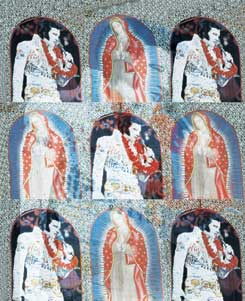
- The cult of Elvis
By Peter Robinson
(Canberra Times, May 9, 2002, Times Out section, p. 1-3)
Elvis has transcended rock stardom - and become a near deity. ... Somewhere in Canberra, probably dominating a living room, stands a two-metre resin cast statue of Elvis preserved in his youthful beauty. ... Readers seeking guidance or merely wanting to discover the true nature of Elvis have two immediate choices. First, enrol in the "Elvis Presley as a 20th Century Phenomenon" with the University of the Third Age. Second, attend Elvis at the Canberra Theatre next Sunday where Elvis's buddy, Joe Esposito, will answer any questions while Mick Gerace gyrates his pelvis and sings in the Elvisian way to the accompaniment of a 16-piece band. ... In Esposito's view, Elvis "couldn't handle the fame. He was naive [and] not street smart. He'd been protected by his mother. We all tried to help him. He didn't like losing challenges. He didn't like growing old ... he never talked about his problems. But he'd help you with your problems."
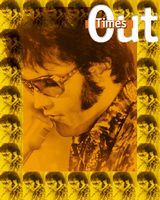
- ELVIS: King of Rock, Man of God:
While white Pentecostalism shaped him, Presley absorbed the style of black Southern gospel music
By CECILE S. HOLMES
(Salt Lake Tribune, February 24, 2001)
The best of Elvis' gospel music will be released in March in Christian bookstores and retail shops through Provident Music Distribution and RCA in the USA. The CD set offers 56 recordings, many of them rare. While white Pentecostalism's rituals and behaviors shaped him, Presley crossed many traditional boundaries, also absorbing the style and ethos of Southern black gospel music. Presley's multifaceted image contributes to the adulation that has survived his death.
- Elvis Presley Mural Painted Over
(Excite news, August 1, 2001)
A mural intended to preserve an old band shell in a city park has been painted over because it depicted Elvis Presley surrounded by religious symbols. The artwork, which a Baptist youth group put up, appeared over the stage of the city amphitheater where Presley made his first concert appearance. It showed a likeness of Presley surrounded by a cross, a menorah and the Star of David. The religious symbols raised questions about whether the painting was appropriate on public property. Carey Hoffman, Memphis administrator of museums, said the city had not authorized a change in the Overton Park Shell's appearance. "It was decided to return it to its original form," Hoffman said. The amphitheater is maintained and informally overseen by a civic group called Save Our Shell. Group spokesman Scott Banbury said the mural was painted over Monday after city leaders complained about it. Banbury said a Baptist youth group got permission to paint the mural as a community project earlier this month. It was not clear in advance that the art would contain religious symbols, he said. Presley appeared at the shell in 1954 in a show that Slim Whitman headlined. His name was listed on the concert bill as "Ellis Presley."
Go to earlier articles
|




